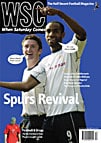 Had the English press not gone over the top, the Turkish media might have made less of the half-time row and still be criticising their own, reports Anthony Lake from Ankara
Had the English press not gone over the top, the Turkish media might have made less of the half-time row and still be criticising their own, reports Anthony Lake from Ankara
We did not get the feared trouble among the fans, but the players decided to make up for it. The arguments and accusations have raged ever since in the media in Turkey as well as in Britain. Initially, the Turkish press was gracious in “defeat” and indulged in a bout of soul-searching about why Turkey can’t beat England, but then, as the stakes got higher, things took a different turn, as the vilification of Alpay in England reached ridiculous and potentially dangerous levels.
The funniest post-match commentary was the front page of the football daily Fanatik, which was all black and read: “It’s all darkness. It is not to be, it is not to be, it is not to be. The English are always our nightmare, yesterday everything was in our favour, but we got too stressed and we couldn’t do it. When we could have gone directly to Portugal, there is another obstacle in our way. A pity, a great pity!” Other coverage was less hyperbolic.
The criticism of the behaviour of some Turkey players in Britain was mirrored in Turkish papers, which were highly critical of the failure to keep their cool. One report, in what was a thinly disguised rebuke of the Turkey team, praised the professionalism of the English players and their ability to keep their minds focused in a difficult situation. All in all the coverage was fair-minded towards England and acknowledged that they had deserved their draw.
But the tone of post-match comment changed when the footage of the bust-up in the tunnel emerged. Commentators were quick to see an opportunity to shift the blame for the scrapping away from Alpay and his team-mates. As we have all seen, the clip shows some of the England players lunging towards Hasan Sas, who was alleged to have spat at Ashley Cole. That, if it happened, occurred before the camera began to roll, so in the clip it looks like the England players are the unprovoked aggressors. It is hard to avoid the suspicion that the footage would not have been released if it could not have been used to question the version of the story, in which Turkish players were to blame, that was taking shape on the basis of what the two sets of players were saying to the press.
In Turkey and in England there has been much “he did this” and “they did that” and it is impossible to know who is telling the truth. However, the man at he centre of it all, Alpay, admitted in a television interview on the weekend following the game that he had said what David Beckham had accused him of saying when the England captain missed the penalty. Beckham put it euphemistically when he said that Alpay had said something about his mother and Alpay himself was coy in his phrasing when he made his confession, saying: “I asked if his mother was OK.” Everyone watching knew that he was admitting to having said to Beckham: “I fuck your mother,” which is a common Turkish insult. It carries the connotation that you are not man enough to stop me from doing it. In response, the interviewer did not criticise Alpay.
This is all rather shabby, but Alpay would probably not been have been given so easy a ride in the interview if the whole of England had not been baying for his blood. Indeed, he was severely criticised in the immediate aftermath of the match by team-mates, his manager and the Turkish media. Now, though, he was able to portray himself as the victim, who had only been being waggish in his remarks to Beckham.
In a Guardian interview before the match, Tugay said that Turkish football has measured its progress in terms of successes against England and English clubs, referring to the 3-3 draw between Manchester United and Galatasaray at Old Trafford in 1993 as the turning point, then linking that with Turkey’s third place in the 2002 World Cup, and with the forthcoming game. This might explain why the Turkey players were so hyped up, but it is no excuse.
From WSC 202 December 2003. What was happening this month